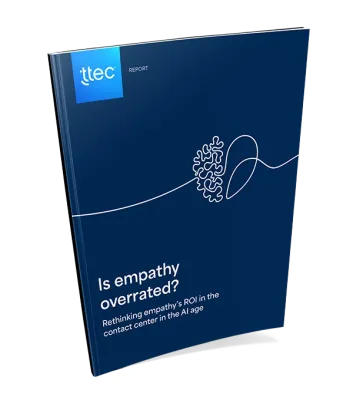The benefits of cloud migration and cloud-based tools—faster deployment times, cost savings, scalability, true omnichannel and more—are clear for many contact center leaders. What’s less clear is, when selecting a cloud partner to implement, deploy, and measure those benefits, when does it make sense to go with one type of partner over the other?
As you go through this thought process, here are 5 questions to help determine whether you should work with a partner that provides an end-to-end cloud ecosystem solution or a “single-stack” solution that can completely satisfy your needs.
1. Do you have cloud computing figured out?
If your executive leaders are knowledgeable about the latest best practices in cloud computing procurement, implementation, and deployment, consider yourself fortunate. After all, there’s a lot to consider. Even after selecting single-stack or out-of-the-box solution, you should also have a plan for integrating other components such as analytics, AI, machine learning, automation, and application infrastructure, into a unified system.
If you don’t have all of that figured out, an end-to-end cloud ecosystem solutions partner can help firms integrate various best-of-breed solutions to take advantage of the best technology apps in the market versus settling for an out-of-the-box solution. Or, a partner could help you enable a hybrid contact center strategy, moving certain applications to the cloud first.
2. Is your goal to shift features and functionality into the cloud without improving the customer experience?
For more and more companies, moving data into the cloud or replicating on-premise features is only the beginning. Business leaders are looking to cloud computing to differentiate the customer experience. Advances in cloud computing and APIs are enabling contact centers to integrate and implement new digital solutions faster, seamlessly shift between chatbots and humans, quickly scale capacity up and down, and more.
However, if you need a stand-alone system that performs a few basic functions or are simply looking to transfer existing on-premise features into the cloud, then an out-of-the-box solution might make sense. The other option is to select a solutions partner that can share best practices, insights, and ideas for advancing your cloud infrastructure to deliver even greater value.
We find that many companies underutilize the potential of the latest contact center platforms, and therefore selecting a deployment partner that can analyze your business and make recommendations on how to take full advantage of technological advancements can be critical in optimizing your ROI.
3. Do you have a plan for ensuring a smooth transition to the new technology?
The phrase, “if you build it, they will come” doesn’t always apply in business. Innovation often requires new behaviors from leaders and employees that may be antithetical to the existing corporate culture. On that note, has your company ensured a smooth transition from one platform to another, particularly in terms of user interface, features, and new KPIs? Do your employees understand how cloud computing will benefit them and do they possess the right skills to leverage the new platform and tools?
In our experience, most companies benefit from a customized learning and performance strategy to train employees on the cloud technology, analytics to measure ROI performance, change management assistance, etc.
4. Do you have the right talent to design, deploy, and manage a successful contact center cloud migration?
By 2022, the talent pool for emerging technologies will be inadequate to fill at least 30 percent of global demand, estimates IDC. Rackspace estimates that the lack of cloud talent has the potential to cost enterprises as much as $258 million a year.
Today’s pace of innovation in the cloud is rapidly accelerating. What’s more, it’s often difficult to extend legacy IT operations tools to the cloud, so cloud team experts are needed for monitoring, provisioning, troubleshooting, and other steps. But if your team already possesses the right cloud computing skills in addition to having a system in place for scaling internal, cross-functional knowledge across the organization, there’s no need to work with a forward-looking partner. We often find companies will augment their existing contact center technology team with cloud specialists to help them transition and evolve their expertise into this new architectural paradigm.
5. Do you have a cloud center of excellence?
The cloud computing space is constantly evolving due to rapid technology enhancements and changing customer needs. This is why experts recommend creating a cloud center of excellence where different groups in a company are able to communicate, promote, collaborate, and share knowledge about cloud computing strategies, insights, and trends with the rest of the business. It’s common, though, for organizations to seek help building a cross-functional team of people to develop and manage cloud strategy best practices for the rest of the organization.
Next steps in moving to the cloud
If you find yourself answering "no" to any of the questions above, an end-to-end cloud ecosystem partner may be the better (and smarter) fit.
Working with a comprehensive services partner provides numerous cost and innovation benefits, such as:
- Industry specialist knowledge
- Knowing how to deliver the optimal ROI from your cloud solution
- Expert guidance on improving your customer and employee experience as you migrate to a new solution
- Reduced labor and overhead costs
- Increased flexibility
Innovation opportunities
Migrating to the cloud is about more than technology; it is about proactive business transformation. In addition to the technical and structural requirements of the migration, companies must define the business drivers for the migration and the desired outcome, not to mention train employees on the new technology and processes—areas where an experienced partner could offer valuable assistance. It’s a decision that shouldn’t be taken lightly, and one that’s often enhanced by working with a strong CX partner.














